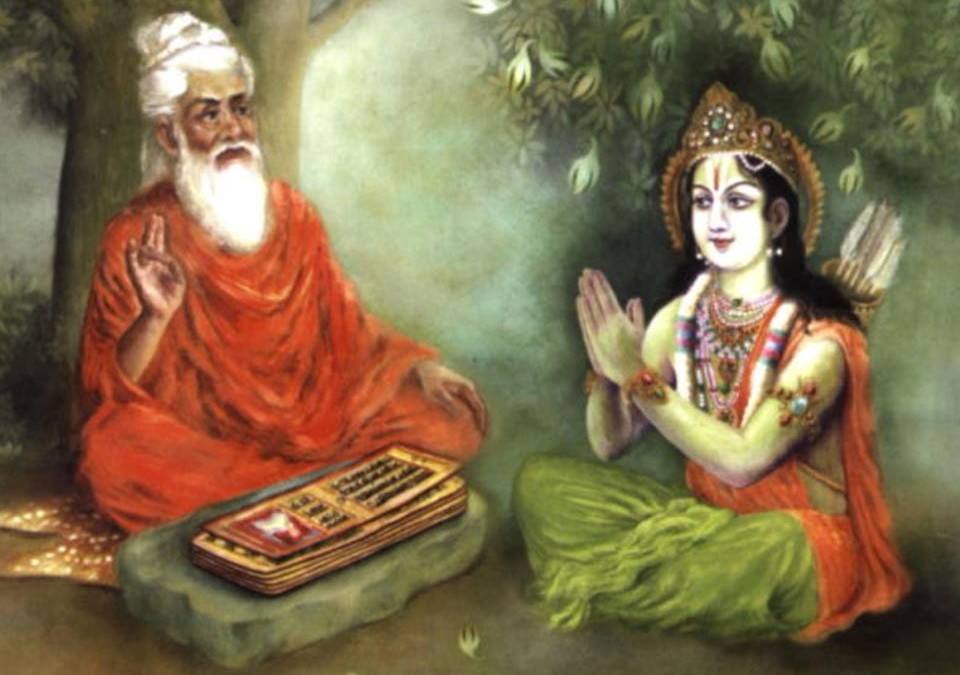THE WISDOM OF SAGE VĀSIṢṬHA:
FOUR GATE-KEEPERS OF LIBERATION[1]
O Rama, there are four gatekeepers at the entrance to the Realm of Freedom (Moksa). They are self-control, spirit of enquiry, contentment and good company. The wise seeker should diligently cultivate the friendship of these, or at least one of them.
The truth is realized by means of enquiry into self-nature, when the mind is at peace, one rests in the bliss that is his essential nature. Such bliss is possible only by self-knowledge, not by any other means. Hence, one should apply oneself constantly to self-knowledge—this alone is one’s duty. In order to cross this formidable ocean of samsara* (repetitive history), one should resort to that which is eternal and unchanging. He alone is the best among men, O Rama*, whose mind rests in the eternal and is, therefore, fully self-controlled and at peace.
When the mind is at peace, pure, tranquil, free from delusion or hallucination, untangled and free from cravings, it does not long for anything nor does it reject anything. This is self-control or conquest of mind. All that is good and auspicious flows from self-control. He who looks upon all beings with equal vision, having brought under control the sensations of pleasure and pain, is self-controlled.
The wise man regards strength, intellect, efficiency and timely action as the fruits of enquiry.[2] Indeed kingdom, prosperity, enjoyment, as well as final liberation, are all the fruits of enquiry. What is enquiry? To enquire thus: “Who am I?” is the true enquiry.
Knowledge of truth arises from such enquiry; from such knowledge there follows tranquility in oneself; and then there arises the supreme peace that passeth understanding and the ending of all sorrow.
What is contentment? To renounce all craving for what is not obtained unsought and to be satisfied with what comes unsought, without being elated or depressed even by them—this is contentment. As long as one is not satisfied in the self, he will be subjected to sorrow. With the rise of contentment the purity of one’s heart blooms.
The contented man who possesses nothing owns the world.
Satsanga (company of the wise, holy and enlightened persons) is yet another gate-keeper to liberation. Satsanga is indeed superior to all other forms of religious practice like charity, austerity, pilgrimage and the performance of religious rites.
These four—contentment, satsanga (company of wise people), the spirit of enquiry, and self-control—are surest means to liberation. Contentment is the supreme gain. Satsanga is the best companion to the destination. The spirit of enquiry itself is the greatest wisdom. And, self-control is supreme happiness. If you are unable to resort to all these four, then practise one: by the diligent practice of one of these, the others will also be found in you. The highest wisdom will seek you of its own accord.
Self-Effort or Fate?
What is called fate or divine will is nothing other than the action or self-effort of the past. A battle is constantly going on between the effects of the past actions (prarabhda) and present self-effort. That which is stronger at the moment, wins.
The present is infinitely more potent than the past. The fruition of self-effort by which one experiences the good and bad results of past action is called fate by people. Self-effort alone is another name for divine will.[3]
[1] Based on Swami Venkatesananda, ed. and trans., Vāsiṣṭha’s Yoga (Albany, New York: State University Press of New York, 1993), 30-34.
[2] According to Swami Venkatesananda, vicāra or enquiry is neither reasoning nor analysis: it is directly looking into oneself. See Swami Venkatesananda, ed. and trans., Vāsiṣṭha’s Yoga, 33. Emphasis added.
[3] Ibid., 26-28.


Recent Comments